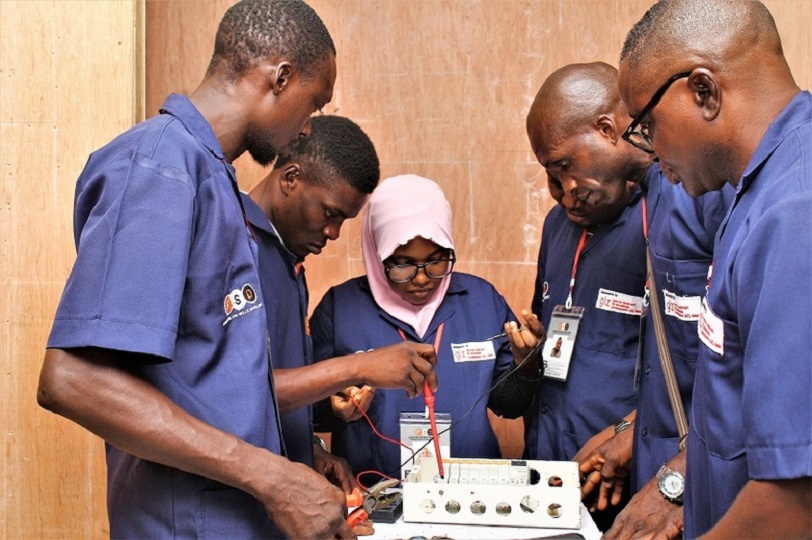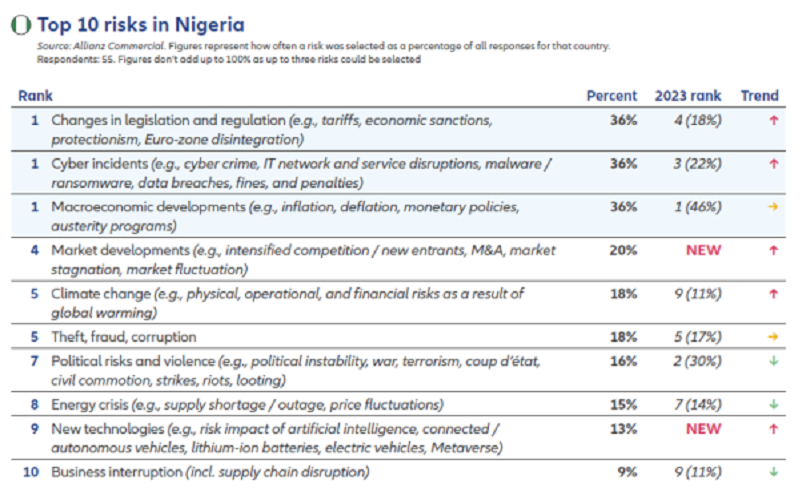General
Allianz Sees Corruption, Shortage of Skills, Energy as Top Risks in Nigeria

By Aduragbemi Omiyale
Three top risks have been identified in Nigeria by Allianz Global Corporate & Specialty (AGCS) in its 12th annual survey of key business risks around the world, according to 2,700+ respondents.
In the report made available to Business Post, it was stated that corruption, shortage of skills due to the migration of young Nigerians abroad, and energy are the country’s top risks.
These risks, identified through the Allianz Risk Barometer, were grouped under macroeconomic developments, political, and cyber risks.
Respondents were questioned during October and November 2022, with a focus on large- and small- to mid-size companies.
They were asked to select the industry about which they were particularly knowledgeable and to name up to three risks they believed to be most important.
Nigeria has for many years battled with corruption in government, with the efforts yielding little or no result.
In 2015, President Muhammadu Buhari, after he defeated former President Goodluck Jonathan, he promised to fight corruption and clean the government.
However, almost eight after, his administration has been accused of unprecedented corruption and others, including crude oil theft and fuel subsidy.
The high level of corruption and insecurity in the country has forced some young Nigerians to travel to countries like Canada, the United Kingdom, the United States and others.
It was recently reported that many bank and health workers were resigning to japa (flee) from the country for a better life outside.
In the report by Allianz, it was disclosed that “in Nigeria, the top three risks are Macroeconomic developments (#1 from #3), Political risks and violence maintains second position, and Cyber incidents slide down two places to #3.”
As for the others, the report said cyber incidents and business interruption rank as the biggest company concerns for the second year in succession (both with 34% of all responses).
However, it is macroeconomic developments such as inflation, financial market volatility and a looming recession (up from #10 to #3 year-on-year), as well as the impact of the energy crisis (a new entry at #4) which are the top risers in this year’s list of global business risks, as the economic and political consequences of the world in the aftermath of Covid-19 and the Ukraine war take hold.
Such pressing concerns call for immediate action from companies, explaining why both natural catastrophes (from #3 to #6) and Climate change (#6 to #7) drop in the annual rankings, as does pandemic outbreak (from #4 to #13) as vaccines have brought an end to lockdowns and restrictions.
Political risks and violence are another new entry in the top 10 global risks at #10, while the Shortage of skilled workforce rises to #8. Changes in legislation and regulation remain a key risk at #5, while Fire/explosion drops two positions to #9. View the full global and country risk rankings and watch a short video here.
“For the second year in a row, the Allianz Risk Barometer shows that companies are most concerned about mounting cyber risks and business interruption. At the same time, they see inflation, an impending recession and the energy crisis as immediate threats to their business.
“Companies – in Europe and in the US in particular – worry about the current ‘permacrisis’ resulting from the consequences of the pandemic and the economic and political impact of the ongoing war in Ukraine. It’s a stress test for every company’s resilience,” the chief executive of AGCS, Mr Joachim Mueller, commented on the findings.
General
Egbin Power to Host FG’s National Data Park, Compute Infrastructure

In a significant move aimed at accelerating Nigeria’s digital economy, Egbin Power, Nigeria’s leading power generation company, has been identified as the ideal location to host the nation’s first National Data Park and Compute Infrastructure.
The Minister for Communications, Innovation and Digital Economy, Dr Bosun Tijani, made this announcement during his visit to the power Plant, where he was received by Group Managing Director, Sahara Power Group, Dr Kola Adesina and the CEO of Egbin Power, Mokhtar Bounour, among others.
The groundbreaking initiative, spearheaded by the Federal Government, aims to harness the power of reliable energy and cutting-edge technology to drive Nigeria’s digital economy forward. The collaboration between Egbin Power and the FG underscores a shared vision to enhance the nation’s technological capabilities and foster innovation in the digital sector.
Dr Tijani was given an overview of the plant and later accompanied by the management team on a tour of the facility. During the discussion, the Minister expressed confidence that Egbin Power has the right environment to host the Data Park, enabling the GenCo to play a crucial role in powering the digital economy.
He stated, “Without a digital economy, the growth we seek cannot be realized. Everything we need to truly power the digital economy exists here in Egbin Power—not only in terms of energy and water, but also in the excellence of the team that runs this facility. That is what is required to fuel the digital economy.”
The Minister highlighted the global advancement in artificial intelligence, emphasizing the need for Africa to catch up with this momentum. He stressed the importance of finding innovative ways to participate in this digital phenomenon. He further noted that Nigeria’s digital economy significantly contributes to the nation’s Gross Domestic Product (GDP), emphasizing that an efficient data centre is vital for harnessing the capabilities of AI and data processing.
Commenting on the strategic collaboration, Dr Adesina said, “There is a nexus between the digital economy and power. Reliable power enhances the functionality of the digital economy, whether in terms of the Internet of Things (IoT), Artificial Intelligence (AI), data utilization, and more.”
He expressed commitment to supporting the establishment of a National Data Park and Compute Centre and other IT infrastructure required for the digital economy. He highlighted Egbin Power’s reliable energy, available land for expansion, and a conducive environment for such digital infrastructure.
“We are here to support the idea of building the Data Park or other IT infrastructure required within the digital economy. We have reliable power, the land and the right environment needed,” he said. Adesina also noted that, since the takeover, significant investments and technological innovations have been done to revitalise the plant, while expansion plans are in the pipeline to double its capacity.
Egbin Power’s CEO, Mokhtar Bounour, reiterated the plant’s dedication to consistent power generation for the national grid in spite of the challenges inherent in the power sector. “We are open to collaborations that will drive Nigeria’s growth and success. We will continue to push boundaries to deliver reliable power to the nation, facilitating socio-economic progress and ensuring our communities and stakeholders thrive,” Bounour stated.
The Minister also toured the Bright Gyimah Innovation Centre, located within Powerfields Schools, owned by Egbin Power. The Innovation Centre serves as a facility for students to acquire skills in Information Technology (IT), Artificial Intelligence (AI), and to explore their creativity in arts, music, and culinary/hospitality fields.
General
Peter Obi Advocates Human Capital Investment to Tackle Trump’s Tariffs

By Adedapo Adesanya
More reactions continue trail the recent tariffs introduced by the administration of President Donald Trump of the United States, and the latest to add his input is the presidential candidate of the Labour Party in the 2023 general election, Mr Peter Obi, who called on African nations to urgently invest in their human capital and scale up productivity.
He made this while speaking at the plenary session of the Commonwealth Enterprise and Investment Council (CWEIC) Trade and Investment Summit 2025 in London on Tuesday.
Mr Obi emphasised that Africa’s pathway to relevance and resilience in the evolving global economy lies in harnessing its youthful population and vast resources.
The former Governor of Anambra State noted that interventions by President Trump had already disrupted long-standing assumptions of global trade, with many nations adopting protective measures to safeguard their economies, lamenting that African countries have largely failed to respond proactively.
“Despite its vast opportunities, Africa’s share of global trade remains at a paltry 2-3 per cent, with its GDP share at about 3 per cent,” Mr Obi stated, adding that Africa’s GDP per capita stands at just $1,900, compared to about $9,000 in Asia per World Trade Organisation (WTO) data.
He warned that this persists even though Africa has the second-largest and most populous continent of about 1.5 billion people and the world’s largest concentration of working-age population
Mr Obi pointed out that the continent boasts abundant natural resources, including nearly a billion hectares of uncultivated arable land and over 30 per cent of the world’s mineral reserves but these remain underutilised.
“Africa holds over 60 per cent of the world’s arable land. Our food and agriculture market, currently valued at $280 billion annually, is projected to exceed $1 trillion by 2030,” he explained, adding that, “With agriculture at the core of our economic transformation, Africa can emerge as a global agricultural powerhouse and a net exporter of food.”
He lamented that leadership remains the lacking element and called for a transformative shift in governance across the continent, advocating one that embraces innovative education, healthcare investment, and poverty reduction.
“What is missing is leadership that can reorder priorities and scale up productivity so that African countries can move into higher levels of value creation,” he argued.
“We have seen promising signs in better-governed African countries. The challenge remains scaling up and sustaining this across the region,” he added.
Mr Obi urged African leaders to learn from Asia’s developmental state model, which prioritised human capital and productivity over mere institutional imports from Western economies, and called for bold, visionary leadership to steer Africa toward economic self-reliance and global competitiveness.
“Africa must rebuild its economies through leadership that focuses on rapid upgrades in productive capacities, especially in education and healthcare, to lift millions out of poverty and seize the opportunities of the new global economy,” he said.
General
Petrol Station Owners Task Ojulari on Kaduna, PH Refineries Reactivation

By Adedapo Adesanya
The Petroleum Products Retail Outlets Owners Association of Nigeria (PETROAN) has tasked Mr Bashir Bayo Ojulari, the new chief executive of the Nigerian National Petroleum Company (NNPC) Limited, to rehabilitate the remaining moribund refineries and increase the country’s crude oil production.
The group in a statement said the appointment of Mr Ojulari, a former Shell engineer, is a “masterstroke” given his reputation for excellence in the oil and gas industry.
The National President of PETROAN, Mr Billy Gillis-Harry, in the statement praised the erstwhile chief executive of the NNPC, Mr Mele Kyari, for his tenure, but says the new Sheriff in town must work for the transformation of Nigeria’s oil industry.
“Engineer Ojulari brings with him decades of experience, a track record of integrity, and a reputation for delivering results. We are confident he will steer NNPCL toward innovation, accountability, and value creation.
“We thank Engr Kyari for his monumental efforts. His leadership revived the Port Harcourt and Warri refineries, which had remained dormant for years, and also helped push production figures upward. History will not forget his contributions,” Mr Gillis-Harry said.
The association also outlined its agenda for the man, which includes critical reforms to deepen investor confidence and ensure petroleum product availability for Nigerians.
“PETROAN expects the Ojulari-led NNPCL to pursue the resumption of Kaduna refinery operations and the timely completion of the second Port Harcourt refinery.
“Also, we call for improved stakeholder communication. Transparency in operations, sales, and production figures will go a long way in rebuilding public and investor trust.”
Mr Gillis-Harry called on other major industry groups to close ranks and support Mr Ojulari.
“We urge MEMAN, DAPPMAN, NUPENG, PENGASSAN, and others to work closely with him. We must support this leadership to deliver a new era for our oil and gas industry. The President made the right call. Mr Ojulari is the right man, at the right time, for the right job.”
Among the highlights of PETROAN’s expectations for the new NNPCL leadership include the creation of a business-friendly environment for investors and marketers as well as achieving crude oil production targets of 3 million barrels per day.
Others are, “Producing top-quality petroleum products that meet international standards. Stabilizing fuel prices and promoting healthy competition in the downstream sector. Ensuring transparent communication of operations and results to stakeholders.”
-

 Feature/OPED5 years ago
Feature/OPED5 years agoDavos was Different this year
-
Travel/Tourism9 years ago
Lagos Seals Western Lodge Hotel In Ikorodu
-

 Showbiz2 years ago
Showbiz2 years agoEstranged Lover Releases Videos of Empress Njamah Bathing
-

 Banking7 years ago
Banking7 years agoSort Codes of GTBank Branches in Nigeria
-

 Economy2 years ago
Economy2 years agoSubsidy Removal: CNG at N130 Per Litre Cheaper Than Petrol—IPMAN
-

 Banking2 years ago
Banking2 years agoFirst Bank Announces Planned Downtime
-

 Sports2 years ago
Sports2 years agoHighest Paid Nigerian Footballer – How Much Do Nigerian Footballers Earn
-

 Technology4 years ago
Technology4 years agoHow To Link Your MTN, Airtel, Glo, 9mobile Lines to NIN














